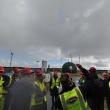RIPEET Study Visit to the Outer Hebrides
20. Sep. 2022
In mid-September, the RIPEET consortium gathered in Stornoway on the Scottish Outer Hebrides Islands to exchange on project progress and to learn about several community energy projects in Scotland. The Outer Hebrides are one of three pilot regions in the RIPEET project, in which co-creative approaches to energy transition challenges are piloted and tested. The other two regions are Extremadura in Spain and Ostrobothnia in Finland. After a project meeting to update all partners on progress, the consortium was able to learn about the specific challenges faced by the Outer Hebrides in a community session and during study visits.
Learning about an island's local energy system
The community session with local stakeholders provided a deep insight into how energy is managed on an island, the regulatory problems that prevent islanders to consume their own renewable energy and the challenge of being dependent on a cable from the mainland. Despite the rich availability of renewable wind energy, the Outer Hebrides faces the highest rate of energy poverty in Scotland. Stakeholders and local community members explained the impact of energy poverty to their daily lives and the difficulty of accessing the energy that is locally produced.
The study visits led the consortium to a council-run circular economy waste recycling plant, providing energy to the community, oxygen to the local fish production and biogas for the local garbage collection. The partners also visited a community trust that is using the money generated from three wind turbines to invest in community projects.
Call of Solutions
At the end of the visit, the Consortium was able to launch the Call for Solutions, where funds are granted to one external provider for each region to co-create a solution to the regional need.
The RIPEET project is coordinated by Wolfgang Haider, ZSI.














































